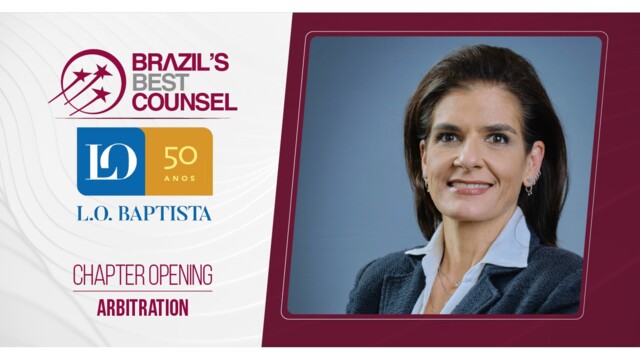27/4/2023

Introduction
Arbitration, is not a static institute. The way in which it reacted to the COVID-19 pandemic leaves no room for doubt of its possibility of evolution and adaptation in the face of circumstances.
Due to social isolation, arbitration procedures have become mostly electronic. Hearings were held virtually, and the submission of hardcopies was suspended.
Unlike what happened with the Judiciary, the pandemic was not a reason for arbitration procedures to be halted and distressed. Players have adapted.
So much so that a recent survey published in the county – carried out by Professor Selma Ferreira Lemes – reported that in 2021 there were 1,047 arbitral procedures under way in the country’s main institutions, which represents an increase of 5% when compared to 2020.
Further on, we will address the main developments of the institute in Brazil in 2021 and what is expected for the future.
Confidentiality
Research around the world – such as the one carried out in 2018 by the School of International Arbitration, at Queen Mary University of London, for example – has already identified that the possibility of assigning confidentiality to arbitration is a preponderant element when choosing the institute as a form of conflict resolution.
The Brazilian Arbitration Law (Law No. 9,307, of September 23, 1996) does not impose that all arbitrations must be confidential, but rather allow the parties to choose that path. In other words, for the procedure to run under seal, it is necessary that the arbitration clause or the regulation of the arbitration institution elected by the parties determine such a rule. Otherwise, there is no obstacle to advertising.
This is indeed a preferred topic of debate as one may argue that there is a universal movement to make confidentiality more flexible. This change has been requested by some of the institute’s users.
A recently published study carried out by the Brazilian Arbitration Committee (“CBAr”), together with the Ipsos Institute, demonstrated that in Brazil there is a predisposition to publishing arbitral awards. And that is the direction to where the country is heading.
The new Resolution No. 80 edited by the Securities and Exchange Commission (“CVM”), which will be the subject of the next topic, mitigated the confidentiality of arbitration proceedings to give greater visibility to the demands capable of affecting the rights of shareholders and investors in general.
There were also a few decisions handed down by the São Paulo Court of Appeals that excluded the automatic application of judicial secrecy in court proceedings that discuss aspects related to an arbitration.
It is also worth noting that the Arbitration and Mediation Center of the Brazil-Canada Chamber of Commerce (“CAM-CCBC”) leads a study group that investigates whether publishing extracts of arbitral awards, in line with the policy embraced by the International Chamber of Commerce (“ICC”) in January 2019 would be accepted by local the arbitral community.
Publicly traded companies
While performing its role, the CVM (Brazilian SEC) seeks to protect the rights of the general public (non-institutional investors especially) and those related to the public savings. With this, in order to enable the analysis of the conditions of the investees for decision-making, the CVM, after the public hearing SDM No. 01/21, edited the aforementioned Resolution No. 80, replacing Normative Resolution No. 480.
The new resolution brought obligations for the company’s management, in cases involving corporate disputes. As of May 2, 2022, listed companies have to disclose, within 7 business days, the following: (a) the commencement of any arbitration procedure, indicating the parties, amounts, assets or rights involved, main facts, request or provision claimed; (b) with regard to any arbitration, information on certain acts of the procedure, such as, for example, the signing the Terms of Reference, decisions on precautionary measures, arbitration awards and agreements actually signed.
It should be noted that, in no way, the obligations arising from the new resolution may be set aside, either through the arbitration agreement or by the regulations of the arbitration institutions.
The next step will now be the regulation by the arbitration chambers. The measure is in line with the wishes of users of the arbitration institute and will certainly bring greater legal certainty to investors.
Arbitration and Judiciary
For the second year in a row, Brazil or rather Brazilian nationality ranks second among all arbitration proceedings administered by the ICC. Among other factors, the positioning of the Judiciary when deciding issues that, to some extent, deal with the arbitration, put Brazil in this position and under the spotlight.
Recent decisions handed down by the Judiciary have reinforced the friendly approach our courts have to arbitration. Brazilian Courts are quick to recognize frivolous litigation and appeals, especially when impartiality of an arbitrator is questioned in a later stage only to try to justify a weak annulment case.
In a certain case, of significant national repercussion, the party unhappy with the result of the arbitration challenged an arbitrator based on facts that allegedly took place years before. The São Paulo Court of Appeal understood that the allegation should have been raised at the first opportunity when the party became aware of the fact and not only after an unfavorable award was delivered.
With that, once again, the arbitral tribunal’s decision prevailed and, by reflex, the arbitration.
This stance of the São Paulo Court of Justice, which has been repeated in the various courts of the country, is important so that the users of the institute, also at an international level, have legal certainty to choose Brazil as the seat of arbitration.
Experience has shown that Brazil is increasingly becoming an ‘arbitration-friendly’ country.
Future
Transparency in arbitration has been another hot topic around the world, as well as in Brazil, especially regarding the means of verifying it. Therefore, the mitigation of confidentiality is discussed. And, as seen, in the last year, some measures in the country were taken in this direction.
Thus, not only arbitrations involving the Public Administration, whether direct or indirect, need to give certain publicity to third parties, by virtue of the law. Arbitrations that involve corporate disputes and that may affect the rights of shareholders and investors in general must also, in compliance with CVM Resolution No. 80, disclose certain information. Both in relation to one and the other, are necessarily regulated by the arbitration institutions.
Certainly, there is great difficulty in finding the balance between confidentiality and publicity. The dividing line between one and the other is thin and narrow. The topic will continue to be the scene of great debates.
The adequate support that arbitration receives from the Judiciary, on the other hand, is a fait accompli and valuable for the fortification of the institute, which, dynamic as it is, will encounter new obstacles on the way, which will certainly be overcome.
ABOUT THE AUTHOR
Silvia Rodrigues Pachikoski | [email protected] | +55 11 31470800
Silvia has extensive experience in the judicial and administrative litigation area, involving civil, commercial and consumer relations, with definition of procedural strategies, preparation of documents and monitoring of disputes in all instances of the Judiciary and solid experience conducting judicial hearings, meetings before Public Administration bodies, State and Federal Public Ministry. Silvia also acts and acted in several arbitration procedures, national and international, both as an arbitrator and as a lawyer, in the corporate area, mergers and acquisitions, construction, business contracts, real estate, franchises, among others.
Disponível em https://www.leadersleague.com/en/news/brazil-s-best-counsel-2023-chapter-opening-arbitration.



